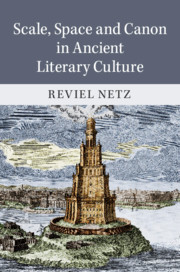Description
Scale, Space and Canon in Ancient Literary Culture
Author: Netz Reviel
A history of ancient literary culture told through the quantitative facts of canon, geography, and scale.
Language: EnglishApproximative price 64.99 €
In Print (Delivery period: 14 days).
Add to cart
Publication date: 02-2020
902 p. · 16.3x23.5 cm · Hardback
902 p. · 16.3x23.5 cm · Hardback
Description
/li>Contents
/li>Biography
/li>
Greek culture matters because its unique pluralistic debate shaped modern discourses. This ground-breaking book explains this feature by retelling the history of ancient literary culture through the lenses of canon, space and scale. It proceeds from the invention of the performative 'author' in the archaic symposium through the 'polis of letters' enabled by Athenian democracy and into the Hellenistic era, where one's space mattered and culture became bifurcated between Athens and Alexandria. This duality was reconfigured into an eclectic variety consumed by Roman patrons and predicated on scale, with about a thousand authors active at any given moment. As patronage dried up in the third century CE, scale collapsed and literary culture was reduced to the teaching of a narrower field of authors, paving the way for the Middle Ages. The result is a new history of ancient culture which is sociological, quantitative, and all-encompassing, cutting through eras and genres.
Acknowledgments; General introduction; Part I. Canon: 1. Canon: the evidence; 2. Canon in practice: the polis of letters; Part II. Space: 3. Space, the setting: the making of an Athens-against-Alexandria Mediterranean; 4. Space in action: when worlds diverge; Part III. Scale: 5. A quantitative model of ancient literary culture; 6. Scale in action: stability and its end; Coda to the book; Bibliography; Index.
Reviel Netz is the Patrick Suppes Professor of Greek Mathematics and Astronomy at Stanford University, California. He is a prolific author in many fields, from verse through literary theory to modern environmental history, and his core field is the history of the ancient exact sciences. He has pursued a more cultural, cognitive and literary approach to the history of science and has published a series of studies, beginning with The Shaping of Deduction in Greek Mathematics (Cambridge, 1999). He is also the translator and editor of the Cambridge editions of the works of Archimedes, two volumes of which have been published to date, and one of the main contributors to the study of the Archimedes Palimpsest, on which he co-authored (with William Noel) The Archimedes Codex (2007), which has been translated into eighteen languages.
© 2024 LAVOISIER S.A.S.
These books may interest you

A Companion to Ancient Epigram 206.11 €




